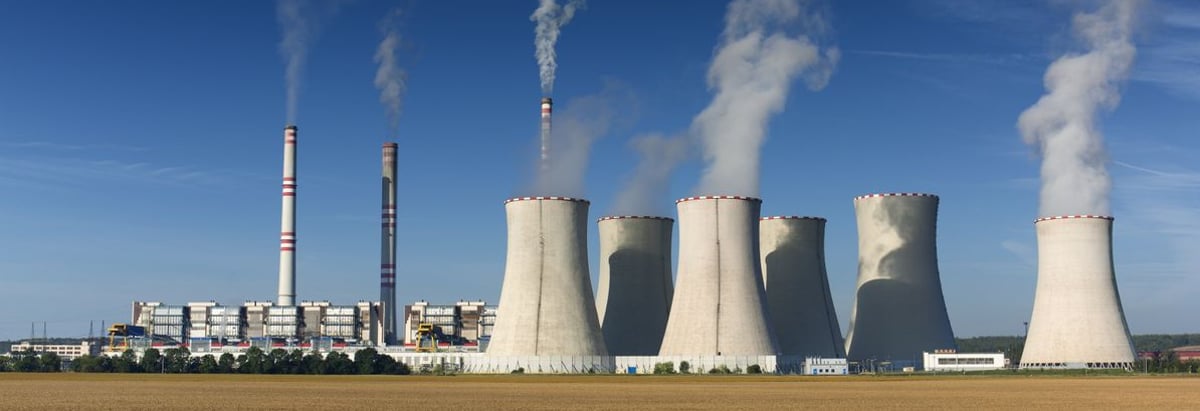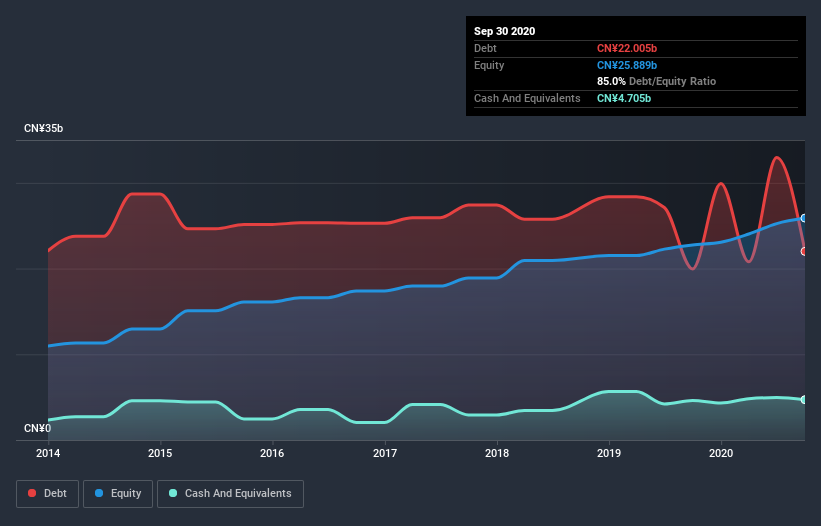- Hong Kong
- /
- Renewable Energy
- /
- SEHK:579
These 4 Measures Indicate That Beijing Jingneng Clean Energy (HKG:579) Is Using Debt Extensively

Some say volatility, rather than debt, is the best way to think about risk as an investor, but Warren Buffett famously said that 'Volatility is far from synonymous with risk.' So it might be obvious that you need to consider debt, when you think about how risky any given stock is, because too much debt can sink a company. As with many other companies Beijing Jingneng Clean Energy Co., Limited (HKG:579) makes use of debt. But the real question is whether this debt is making the company risky.
What Risk Does Debt Bring?
Debt is a tool to help businesses grow, but if a business is incapable of paying off its lenders, then it exists at their mercy. In the worst case scenario, a company can go bankrupt if it cannot pay its creditors. While that is not too common, we often do see indebted companies permanently diluting shareholders because lenders force them to raise capital at a distressed price. Of course, plenty of companies use debt to fund growth, without any negative consequences. The first thing to do when considering how much debt a business uses is to look at its cash and debt together.
See our latest analysis for Beijing Jingneng Clean Energy
What Is Beijing Jingneng Clean Energy's Net Debt?
As you can see below, at the end of September 2020, Beijing Jingneng Clean Energy had CN¥22.0b of debt, up from CN¥20.0b a year ago. Click the image for more detail. However, it also had CN¥4.70b in cash, and so its net debt is CN¥17.3b.

A Look At Beijing Jingneng Clean Energy's Liabilities
Zooming in on the latest balance sheet data, we can see that Beijing Jingneng Clean Energy had liabilities of CN¥22.4b due within 12 months and liabilities of CN¥19.2b due beyond that. Offsetting these obligations, it had cash of CN¥4.70b as well as receivables valued at CN¥8.27b due within 12 months. So it has liabilities totalling CN¥28.6b more than its cash and near-term receivables, combined.
The deficiency here weighs heavily on the CN¥17.8b company itself, as if a child were struggling under the weight of an enormous back-pack full of books, his sports gear, and a trumpet. So we definitely think shareholders need to watch this one closely. At the end of the day, Beijing Jingneng Clean Energy would probably need a major re-capitalization if its creditors were to demand repayment.
We use two main ratios to inform us about debt levels relative to earnings. The first is net debt divided by earnings before interest, tax, depreciation, and amortization (EBITDA), while the second is how many times its earnings before interest and tax (EBIT) covers its interest expense (or its interest cover, for short). The advantage of this approach is that we take into account both the absolute quantum of debt (with net debt to EBITDA) and the actual interest expenses associated with that debt (with its interest cover ratio).
Beijing Jingneng Clean Energy's debt is 2.8 times its EBITDA, and its EBIT cover its interest expense 3.2 times over. Taken together this implies that, while we wouldn't want to see debt levels rise, we think it can handle its current leverage. Fortunately, Beijing Jingneng Clean Energy grew its EBIT by 3.1% in the last year, slowly shrinking its debt relative to earnings. There's no doubt that we learn most about debt from the balance sheet. But ultimately the future profitability of the business will decide if Beijing Jingneng Clean Energy can strengthen its balance sheet over time. So if you want to see what the professionals think, you might find this free report on analyst profit forecasts to be interesting.
But our final consideration is also important, because a company cannot pay debt with paper profits; it needs cold hard cash. So the logical step is to look at the proportion of that EBIT that is matched by actual free cash flow. Over the last three years, Beijing Jingneng Clean Energy reported free cash flow worth 16% of its EBIT, which is really quite low. For us, cash conversion that low sparks a little paranoia about is ability to extinguish debt.
Our View
We'd go so far as to say Beijing Jingneng Clean Energy's level of total liabilities was disappointing. Having said that, its ability to grow its EBIT isn't such a worry. Overall, it seems to us that Beijing Jingneng Clean Energy's balance sheet is really quite a risk to the business. For this reason we're pretty cautious about the stock, and we think shareholders should keep a close eye on its liquidity. The balance sheet is clearly the area to focus on when you are analysing debt. However, not all investment risk resides within the balance sheet - far from it. Consider for instance, the ever-present spectre of investment risk. We've identified 2 warning signs with Beijing Jingneng Clean Energy , and understanding them should be part of your investment process.
If you're interested in investing in businesses that can grow profits without the burden of debt, then check out this free list of growing businesses that have net cash on the balance sheet.
If you decide to trade Beijing Jingneng Clean Energy, use the lowest-cost* platform that is rated #1 Overall by Barron’s, Interactive Brokers. Trade stocks, options, futures, forex, bonds and funds on 135 markets, all from a single integrated account. Promoted
Valuation is complex, but we're here to simplify it.
Discover if Beijing Jingneng Clean Energy might be undervalued or overvalued with our detailed analysis, featuring fair value estimates, potential risks, dividends, insider trades, and its financial condition.
Access Free AnalysisThis article by Simply Wall St is general in nature. It does not constitute a recommendation to buy or sell any stock, and does not take account of your objectives, or your financial situation. We aim to bring you long-term focused analysis driven by fundamental data. Note that our analysis may not factor in the latest price-sensitive company announcements or qualitative material. Simply Wall St has no position in any stocks mentioned.
*Interactive Brokers Rated Lowest Cost Broker by StockBrokers.com Annual Online Review 2020
Have feedback on this article? Concerned about the content? Get in touch with us directly. Alternatively, email editorial-team@simplywallst.com.
About SEHK:579
Beijing Jingneng Clean Energy
Generates gas-fired power and heat energy, wind power, photovoltaic power, and hydropower in the People’s Republic of China.
Undervalued established dividend payer.

